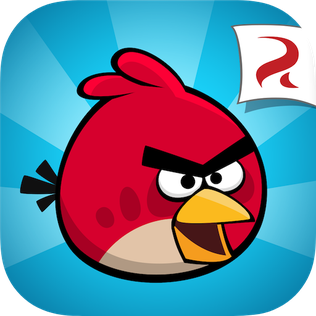
BlackBerry was a brand of smartphones and other related mobile services and devices. The line was originally developed and maintained by the Canadian company BlackBerry Limited from 1999 to 2016, after which it was licensed to various companies.

A mobile game, or smartphone game, is a video game that is typically played on a mobile phone. The term also refers to all games that are played on any portable device, including from mobile phone, tablet, PDA to handheld game console, portable media player or graphing calculator, with and without network availability. The earliest known game on a mobile phone was a Tetris variant on the Hagenuk MT-2000 device from 1994.
Handmark Inc. was an American developer and distributor of mobile content, based in Kansas City, Missouri. The company was created in 2000 by the merger of Mobile Generation Software with Palmspring Software.

Mxit(pronounced "mix it") was a free instant messaging application developed by Mxit (Pty) Ltd. in South Africa that ran on over 8,000 devices, including feature phones, Symbian S60, Android, BlackBerry, iPhone, iPad, Windows Phone and tablets.

Adobe AIR is a cross-platform runtime system currently developed by Harman International, in collaboration with Adobe Inc., for building desktop applications and mobile applications, programmed using Adobe Animate, ActionScript, and optionally Apache Flex. It was originally released in 2008. The runtime supports installable applications on Windows, macOS, and mobile operating systems, including Android, iOS, and BlackBerry Tablet OS.
Keek was a free online social networking service that allowed its users to upload video status updates, which were called "keeks". Users could post keeks to the Keek website using a webcam or via the Keek mobile apps for iPhone, Windows Phone, BlackBerry, or Android. Users could also reply back with text or video comments, known as "keekbacks", and share content to other major social media networks. There was also an embed option so users could embed their keeks into a blog or website.
BlackBerry World was an application distribution service by BlackBerry Limited. The service provided BlackBerry users with an environment to browse, download, and update mobile apps, including third-party applications.
Magmic Inc. is an Ottawa-based developer and publisher of mobile entertainment and lifestyle software. Founded in 2002, they produce original and licensed apps for a variety of mobile platforms, including Java ME, BREW, Sidekick, Windows Mobile, Apple iPhone, Android and BlackBerry.
Titanium SDK is an open-source framework that allows the creation of native mobile applications on platforms iOS and Android from a single JavaScript codebase. Titanium SDK is presently developed by non-profit software foundation TiDev, Inc.

Angry Birds is a 2009 casual puzzle video game developed by Finnish video game developer Rovio Entertainment. Inspired primarily by a sketch of stylized wingless birds, the game was first released for iOS and Maemo devices starting in December 2009. By October 2010, 12 million copies of the game had been purchased from the iOS App Store, which prompted the developer to design versions for other touchscreen-based smartphones, most notably Android, Symbian, Windows Phone, and BlackBerry 10 devices. The series has since expanded to include titles for dedicated video game consoles and PCs. A sequel, Angry Birds 2, was released in July 2015 for iOS and Android. Around April 2019, the original game was removed from the App Store. A paid recreation of the game's content from 2012 was released as Rovio Classics: Angry Birds on March 31, 2022, but later on, Rovio mentioned that they were removing it from the Google Play Store on February 23, 2023, and retitling it as Red’s First Flight.

The BlackBerry PlayBook was a mini tablet computer developed by BlackBerry and made by Quanta Computer, an original design manufacturer (ODM). It was first released for sale on April 19, 2011, in Canada and the United States.

Asphalt 6: Adrenaline is a racing video game developed and published by Gameloft and is the sixth major game of Asphalt series. It was released for iOS on December 21, 2010, for Mac OS X on February 17, 2011, for Android on June 15, for Symbian^3 on July 20, for Mobile phones on August 31, for webOS on September 3, for BlackBerry PlayBook on October 12, and for Bada 2.0 on January 10, 2012.
An app store is a type of digital distribution platform for computer software called applications, often in a mobile context. Apps provide a specific set of functions which, by definition, do not include the running of the computer itself. Complex software designed for use on a personal computer, for example, may have a related app designed for use on a mobile device. Today apps are normally designed to run on a specific operating system—such as the contemporary iOS, macOS, Windows, Linux or Android—but in the past mobile carriers had their own portals for apps and related media content.
A mobile application or app is a computer program or software application designed to run on a mobile device such as a phone, tablet, or watch. Mobile applications often stand in contrast to desktop applications which are designed to run on desktop computers, and web applications which run in mobile web browsers rather than directly on the mobile device.

NFL is a series of American football games that are developed by Gameloft, which is supposed to be a simulation of the National Football League. The game series is released on iOS, as well as Palm, and was originally released on the Nintendo DS. The series first came on the DS as NFL 2009 in 2008. Starting with NFL Pro 2012, the game became free, even though players still have to pay for extra XP. 2012 is also the first game to have experience points, team points, which can be used to boost players, as well as credits, which can be earned by leveling up, as well as watching Gameloft trailers. In NFL Pro 2013, when the player is in a passing play, the camera will zoom into a first-person view from the quarterback's perspective.

Jetpack Joyride is a 2011 side-scrolling endless runner action video game created by Halfbrick Studios. It was released for iOS devices on the App Store on September 1, 2011 and has been ported to other systems. It was released online as a Flash version on May 11, 2012; on Android on September 28; on PlayStation Portable on November 20 in North America and November 21 in Europe; on BlackBerry PlayBook on December 13, 2012; on PlayStation 3 and PlayStation Vita on December 21 in Europe and December 31 in North America; on BlackBerry 10 on March 6, 2013; and on Windows Phone 8 and Windows 8 on June 5. It was also released on PlayStation 4 on April 26, 2016.

Gangstar is a series of open-world action-adventure video games published by video game company Gameloft and developed by its subsidiaries.

The popularisation of mobile games began as early as 1997 with the introduction of Snake preloaded on Nokia feature phones, demonstrating the practicality of games on these devices. Several mobile device manufacturers included preloaded games in the wake of Snake's success. In 1999, the introduction of the i-mode service in Japan allowed a wide variety of more advanced mobile games to be downloaded onto smartphones, though the service was largely limited to Japan. By the early 2000s, the technical specifications of Western handsets had also matured to the point where downloadable applications could be supported, but mainstream adoption continued to be hampered by market fragmentation between different devices, operating environments, and distributors.











